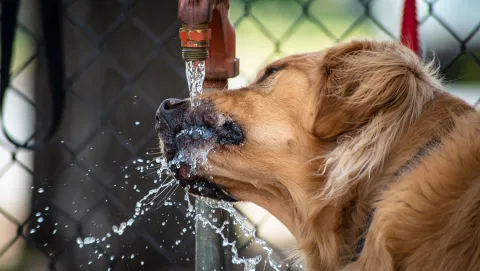Keep your pets safe in the heat

With the temperatures soaring, the Mission Viejo Animal Services Center is reminding you to keep your pets safe in the heat. Dogs and cats cool themselves differently than we do because they cannot sweat. Instead, they regulate their body heat through their mouths and tongues, which is a relatively inefficient method in extreme temperatures. That’s why your pets should remain indoors where it’s cool. Even a garage can get extremely hot, so pets should be kept in the house, preferably with the air conditioner set.
Take care when exercising your pet and adjust intensity and duration of exercise with the temperature. On extremely hot days, limit exercise to early morning or evening hours and be especially careful with short-nosed pets, who typically have difficulty breathing. Asphalt gets very hot and can burn your pet's paws, so walk your dog on the grass if possible. Always carry water with you to keep your dog from dehydrating.
Never leave your pets in a parked car, not even for a minute. On a warm day, temperatures inside a vehicle can rise rapidly to dangerous levels. On an 85-degree day, for example, the temperature inside a car with the windows opened slightly can reach 102 degrees within 10 minutes. After 30 minutes, the temperature will reach 120 degrees. Your pet may suffer irreversible organ damage or even die.
Extreme temperatures can cause heatstroke, so watch your pet carefully. Some signs of heatstroke are heavy panting, glazed eyes, a rapid heartbeat, difficulty breathing, excessive thirst, lethargy, fever, dizziness, lack of coordination, profuse salivation, vomiting, a deep red or purple tongue, seizure and unconsciousness.
Animals are at risk for heat stroke if they are old, very young, overweight, not conditioned to prolonged exercise or have heart or respiratory disease. Some breeds of dogs like boxers, pugs, shih-tzus and other dogs and cats with short muzzles have a much harder time breathing in extreme heat. If you suspect that your pet is suffering from heatstroke, contact your veterinarian immediately!

